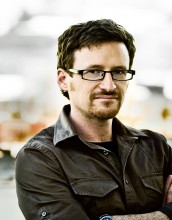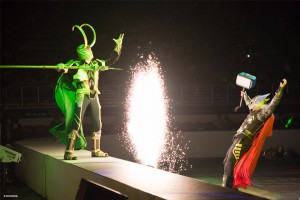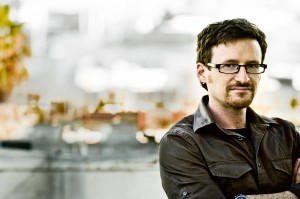Composer Michael Picton has his hands as full as a Cirque du Soleil juggler. Picton has actually worked with Cirque du Soleil. At present, he’s working with Cirque alumnus Chris Lashua on Cirque Mechanics, with Marvel Entertainment on the MARVEL LIVE touring stage show, and with Nickelodeon on their new series MUTT & STUFF.
In a phone conversation, Picton talks about all of these projects and more.
AX: When did you become involved in composing?
MICHAEL PICTON: I mostly became a musician with the intent of becoming a composer from a pretty young age, probably as a teen. After being exposed to some great film scores and some electronic music, I gravitated toward those two things.
AX: Which instruments can you actually play?
PICTON: I’m principally a pianist and a keyboard player and I dabble a little bit in various instruments and I call myself a guitar owner rather than a guitar player. Beyond that, I usually leave the rest of it to the professionals.
AX: Who were your big musical influences?
PICTON: When I started out, John Williams was the sort of pinnacle for me, and then on the electronic side, I was very much enamored of Vangelis’ scores – CHARIOTS OF FIRE, BLADE RUNNER – and a lot of electronic pop music was going on at the same time, and it was just a combination of those influences.
AX: When did you get into composing professionally?
PICTON: I went to university for music in Montreal, and after that, I tried to push my way into writing for film any way I could. I started out doing short films for free in the mid-to-late Nineties, and working for other composers in the Montreal region. So I worked for a few composers. One was a film composer and the other was one of the composers for Cirque du Soleil.
AX: What are the differences between composing for live performance and composing for film or television?
PICTON: For live, you’re composing blind very often, because you’ll often be composing the music before the show is created. With a film or TV show, you’re composing music to an existing picture, so you’re writing to something that exists, and it’s pretty concrete in terms of timing and feel.
Whereas with a live show, you’re generally co-creating the show with the directors and the performers and the other stage artisans. So you’re often creating it from your own imagination as far as what the show should be sounding like, and what the show will end up looking like. So you write to what you imagine a scene or an act might look like in your imagination, and then once you play it for the director and the producers and everybody’s on board with it, you start refining it to what actually is on stage, and so it becomes this back and forth dance between the performers working to the music you’ve written and you adapting the music you’ve written to what the performers are actually doing on stage. So there’s a little more uncertainty and a little more imagination involved in the creation process.
AX: With something like MARVEL LIVE, you’re scoring for characters that have appeared in movies. Do you use any of the existing Marvel movie or cartoon themes for them?
PICTON: No. Xe wanted to show also to be its own entity, so everything in the show is original. It doesn’t reference any of the existing musical themes from the existing Marvel properties, but it doesn’t feel like a completely different Marvel Universe. [There is more rock and electronic music] incorporated with the orchestral sound than you might be used to in a film score, it’s something I had to push a little for that.
AX: Do the characters sing?
PICTON: There’s no singing, it’s not a musical, it’s not SPIDER-MAN: TURN OFF THE DARK. The voices are all recorded, just for the practicality of having to do something like that in an arena setting, but the actors play to the recorded voices, so it ends up being like a comic book with dialogue and a lot of action happening around it, within it, and the music accompanying that action.
AX: Is that done with a live orchestra?
PICTON: It’s all pre-recorded on MARVEL LIVE. It’s really a complicated technical show and everything is locked in and there are a few video elements that are all synchronized to the music, and there are automation elements, flying people around and we need to keep it streamlined. There are some moments where there is some flexibility built in, but on the whole, the whole thing is very interlocked, technology-wise. Also, the music is huge, it’s not only an orchestra, but it’s rock and guitars and everything. There’s no way we could create that entire sound, given the practicality of the touring situation, with a live orchestra.
AX: Did you conduct it for the recording?
PICTON: No. I was so busy in rehearsal writing and mixing it that I left the music director, Dave Killinger, at Feld Entertainment, the task of getting to put it all down on tape.
AX: Who do you deal with at Marvel?
PICTON: I actually work for Feld Entertainment, which is the company that was tasked with producing this, and that’s how I got into it, because Feld Entertainment has a long history of producing Ringling Brothers’ Barnum & Bailey’s Circus, which they own, as well as a long history with Disney, doing the live shows of DISNEY ON ICE. I’ve worked with Feld Entertainment for quite a number of years, writing scores for their circus shows. So they approached and were approached by Marvel to create the show. They engaged me to write the music. Feld Entertainment is very much responsible for the day to day development of the show, obviously with Marvel’s input and approval every step of the way, but it is a Feld Entertainment show, because they have that experience of being able to put this kind of stuff live on the stage, motorcycles and acrobats, that kind of thing.
AX: You’ve also worked with Cirque du Soleil …
PICTON: I’ve not really done any writing for Cirque du Soleil. I worked with their composer for a number of arrangements for them. I did end up joining the cast of one of the Cirque du Soleil shows, QUIDAM, where I worked as keyboardist on tour with the band for about a year and a half, touring throughout Europe, being onstage as an actual circus performer in makeup.
It was great fun. It was a great way to see Europe in the company of a great work of theatre, as far as I’m concerned. QUIDAM is one of my favorite shows of all time, but also in the company of a great band of circus artists, who were marvelous people. They live a lifestyle somewhere between jet-setting and the caravanning circus.
AX: Would you want to perform live onstage again?
PICTON: I do sometimes miss it. The thrill with that kind of show is that you get to recreate the magic every single night and experience the audience’s reaction to it every night, and that’s always very uplifting, it’s a really satisfying experience. I’m very happy and comfortable writing my own music now. I’m doing it in the comfort of my own studio, so I get to exert complete control, but yes, sometimes it’s nice to imagine being back up on stage again.
AX: And what is Cirque Mechanics?
PICTON: Cirque Mechanics is a theatrical circus, which was founded by Chris Lashua, who is an ex-Cirque du Soleil performer. In fact, I know Chris from QUIDAM. He was the original German Wheel performer in the Cirque du Soleil QUIDAM show. He came to fill in for a few nights when the German Wheel performer on our tour was out injured. We’ve kept in touch since then – we have many, many mutual friends in the ex-Cirque du Soleil performer world.
A number of years ago, he created this company called Cirque Mechanics to allow him to create his own circus performances with his own vision. So he started this small troupe, they do shows of with somewhere between seven and ten people, and it’s all founded on the principles of people interacting with machinery. We do circus acts with people interacting with apparatuses. The apparatus can very often be very complicated and baroque, with gears and wheels and chains, but it’s all powered by human muscle and human ingenuity.
I’ve written music for three shows now with Cirque Mechanics. One was a Western called BOOMTOWN, and then we did an orchestra show with this great contraption that they call the Gantry Bike, which allows them to do their shows in a mobile setting. The Gantry Bike is a huge scaffolding on wheels that you can pedal down the street and hang trapeze artists from it. We did shows where we put that apparatus on stage in front of an orchestra and we’d do works with some great pieces of classical repertoire, as well as some original pieces that I wrote for the show.
And our new show is PEDAL PUNK, which uses the Gantry stage, but also many other new apparatuses that Chris and his team come up with. That’s a touring theatrical show that plays in medium-sized theatres around the country, and it’s great fun, and the music I got to write for that is unlike the music I write for, say, Ringling Brothers or for Marvel. It’s a little bit more its own animal, using things like bicycle sounds and prepared piano sounds and the sounds of trampolines bouncing. Everything you hear on stage finds its way one way or another into the music of that show, so it’s a lot of fun and it’s a great theatre show. That’s going to be coming to New York for about a month in the winter, but it’s playing at theatres around the country on tour.
AX: Is that punk? You’ve got “Punk” in the title …
PICTON: Punk is sort of the attitude. There’s a little bit of punk in the music, although for actual punk sounds, some things in the Marvel show are actually closer to that. With PEDAL PUNK, it’s more steampunk than punk-punk. So it’s a fun steampunk show that invokes Victorian machinery, while having a modern playful attitude.
AX: And what is MUTT & STUFF?
PICTON: MUTT & STUFF is something completely different. It’s a TV show [about a school for dogs] I’m working on for Nickelodeon, which is really wacky. I’ve had people my age watch it, completely enraptured [laughs]. Cesar Millan is an executive producer on the show and he makes cameo appearances in it, and it’s the brainchild of Sid and Marty Krofft, along with Bradley Zweig, who’s one of the executive producers, who I know from circus days. Sid and Marty are great legends of children’s television – H.R. PUFNSTUF, LAND OF THE LOST – the list is too long to recount. It’s got the signature Sid and Marty style, with colorful characters and strange puppets and there’s a big dog-suited person who bears a faint resemblance to Mr. H.R. Pufnstuf, and his name is Stuff. Calvin [Millan, Cesar Millan’s real-life son], who is one of the few humans who makes appearances in the show, teaches this school of dogs, and essentially teaches the viewers, lessons in how to live with and teach their dog pets, but all wrapped up in really fun stories with crazy puppets and crazy, colorful characters and strange animation.
AX: Apart from the person in the suit, are the other dogs actual dogs?
PICTON: They’re actual trained dogs, so they work like actors on the show [laughs] and bark their lines and do various tricks and activities and they’re really very charming.
AX: What kind of music do you do for MUTT & STUFF?
PICTON: It’s really colorful, playful stuff. There are a lot of bells and rhythms going on. It’s a cross between Looney Toons music with rock ‘n’ roll.
AX: How would you compare the type and size of music for MUTT & STUFF to a Cirque show to MARVEL LIVE?
PICTON: Marvel’s the biggest of the big. We wanted the biggest-sounding orchestra with the most amazing modern percussion and as heavy guitars and heavy drums as we could muster for everything. So it was really a no-holds-barred assault on the score. So it’s huge from beginning to end, and it never stops for a hundred minutes. The emotions go up and down, but it’s always in the realm of massive.
With MUTT & STUFF, it’s the opposite. It has to have a light touch, whimsical at times. I do write a lot of notes, but they tend to be very light notes and sparse and leave some room for the dogs and humans to play in between them. There’s a lot more play with light textures.
And then the Cirque Mechanics show is its own thing. It’s not very orchestral, it’s geared toward a cross between experimental pop and [mechanical sounds]. Everything relates to something mechanical in one way or another, bicycle sounds, ticking clocks, so it’s a musical design that is very unique in its sound.
AX: Is there anything that you would like to say about your work right now?
PICTON: You can always find what I’m up to lately at michaelpicton.com.
Follow us on Twitter at ASSIGNMENT X
Like us on Facebook at ASSIGNMENT X
Article Source: Assignment X
Article: MARVEL LIVE: Michael Picton chats about the touring stage show – exclusive interview
Related Posts:













